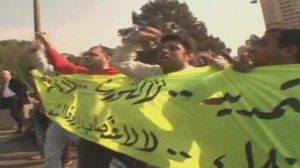 Unprecedented demonstrations sweeping the Middle East and North Africa spread Wednesday to Libya, where police clashed with anti-government protesters in the coastal city of Benghazi, an independent source told CNN.
Unprecedented demonstrations sweeping the Middle East and North Africa spread Wednesday to Libya, where police clashed with anti-government protesters in the coastal city of Benghazi, an independent source told CNN.
About 200 protesters came out to show support for human rights activist and lawyer Fathi Terbil, who had been detained earlier, the source said. Several people were arrested after police confronted the protesters, the source added.
But Libya — ruled by Moammar Gadhafi since 1969 — is not Egypt, said a highly placed Libyan source close to the government who asked not to be identified because he was not authorized to talk to the media.
“There is nothing serious here,” he said. “These are just young people fighting each other.”
 Driven by discontent and fueled by social media, protests in the region spread this week not just to Libya but to Iran and Bahrain. Anti-government sentiment has also manifested itself on the streets of Algeria, Jordan, Syria and Yemen.
Driven by discontent and fueled by social media, protests in the region spread this week not just to Libya but to Iran and Bahrain. Anti-government sentiment has also manifested itself on the streets of Algeria, Jordan, Syria and Yemen.
In Yemen, Sanaa University students protested Wednesday, calling for an improved curriculum, but the demonstration rapidly morphed into an anti-government stand.
Participants said government supporters outside the university gates hurled rocks, but the situation stayed under control. It was at least the sixth day that scuffles had broken out between the government’s supporters and foes.
Activist Abdul Rahman Barman said three anti-government protesters were injured when government supporters attacked them after the demonstration. One had to be hospitalized for head injuries, he said.
Yemeni President Ali Abdullah Saleh has been in power for 32 years but has pledged not to run for re-election when his current term ends in 2013.
In nearby Bahrain, thousands of people marched in a peaceful funeral procession for Ali Abdulhadi Mushaima, who was killed when clashes erupted during the funeral for another protester.
They camped out at the Pearl Roundabout, a landmark in the capital, Manama, that has been adopted by protesters as their Tahrir Square, the epicenter of Egypt’s revolution.
A massive pearl sits at the apex of a circle of inward-sweeping arches, and Wednesday, Bahrainis camped out at its base and painted anti-government slogans.
Later in the day, flag-waving pro-government demonstrators were out in Manama and the second largest city of Muharraq.
New York Times journalist Nicholas Kristof said security forces have backed off after “a concerted deliberate effort to use a truly stunning amount of force.”
“Now that the regime has backed off, it’s a little hard to say where things will go,” Kristof told CNN. “It is possible that … there will be some kind of truce and agreement to have more democracy, some more concessions.”
Large crowds showed up for a funeral as well in the Iranian capital, where 26-year-old Saneh Jaleh was laid to rest.
Iranian authorities said Jaleh belonged to the pro-government Basij militia and was shot to death by the outlawed People’s Mujahedeen of Iran.
But some of Jaleh’s acquaintances disputed that account, and Jaleh’s funeral strangely drew both supporters and foes of the Islamic regime, which has cracked down on dissent even though it publicly praised Egyptians for toppling President Hosni Mubarak.
International journalists are barred from covering Iran’s unrest, but a protester told CNN that police fired tear gas and beat people with batons.
Sara, whose full name has been withheld for security reasons, said she was risking her safety to march on the streets because Jaleh was part of Iran’s reformist Green Movement.
“We are not allowing his blood to go to waste,” she said. “I am doing this for him.”
In the place that gave rise to the spirit of the region’s freedom movement, changes were still slowly unfolding.
Tunisia lifted its midnight-until-4 a.m. curfew, though a state of emergency remains intact, the state-run Tunis Afrique Presse said.
Weeks of demonstrations forced the ouster of longtime President Zine El Abidine Ben Ali in January.
“Tunisia now after the revolution of its population is now searching for its independence,” said Lazhar Samali, an engineer who protested against the government. “It’s a sovereign state, and Tunisia has in its own hands its destiny.”
The end of Ben Ali’s 23-year rule inspired Egyptians, and then others, to rise up for their rights.
Last Friday, after 18 days of mass demonstrations in Egypt, Mubarak stepped down, leaving the nation in the hands of its powerful military.

Leave a Reply
You must be logged in to post a comment.